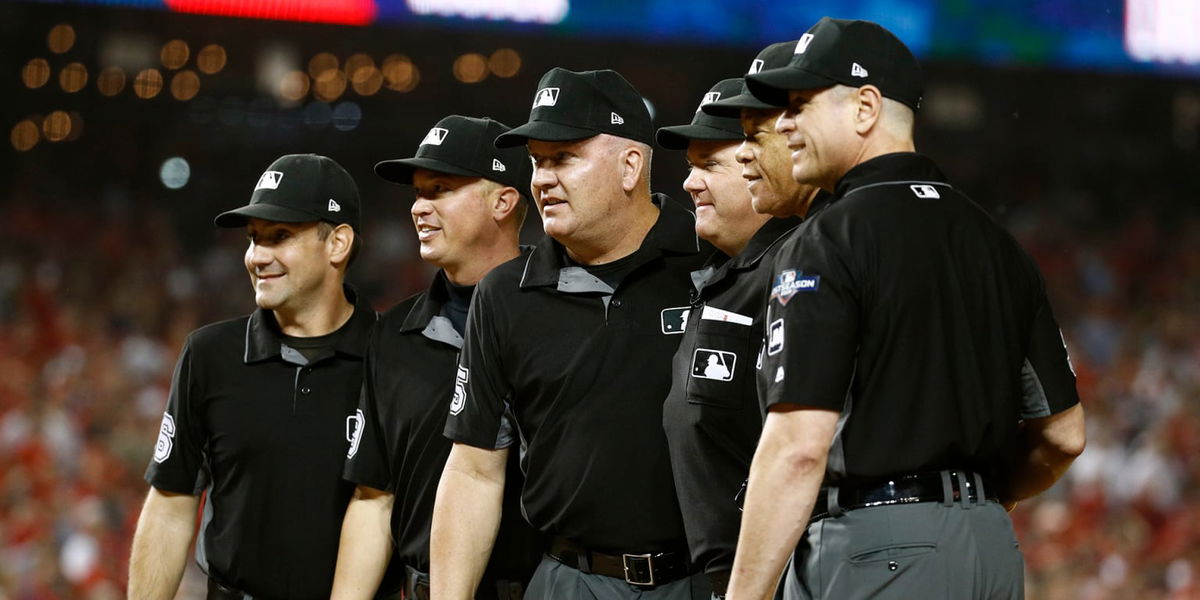
Imago
Credit: MLB.com

Imago
Credit: MLB.com
The 2025 World Series heads to Game 6 with the Toronto Blue Jays one win from glory and the Los Angeles Dodgers fighting to drag this thing to a Game 7. Every swing, every strike, every close call will matter more than ever. That’s where the umpires come in, the crew tasked with keeping chaos from spilling over when the whole baseball world is ready to explode. Here’s who’ll be behind the masks tonight.
Watch What’s Trending Now!
Who Is the Home Plate Umpire for Game 6 of the 2025 World Series?
Adam Hamari will serve as the home plate umpire for Game 6 of the 2025 World Series featuring the Los Angeles Dodgers and Toronto Blue Jays. It marks his first assignment behind the plate in a World Series, despite being on the major league staff since 2017. Hamari has built his career from minor leagues in 2006 to a full-time MLB umpire, with his debut as a part-time umpire in 2013. Throughout the 2025 regular season, he recorded an 8.31 average runs per game as a plate umpire, evidence of his recent experience in high-scoring environments.
ADVERTISEMENT
The role of the home plate umpire in such a high-stakes game cannot be overstated, as every called strike or ball can alter momentum for the Dodgers or the Blue Jays. Hamari will be responsible for managing the strike zone and game flow under immense pressure as the best-of-seven reaches Game 6, a pivotal moment in the series. He does so knowing that one missed call or delayed signal may become a talking point in the press box, among fans and analysts. A recent incident in July 2025 saw Hamari eject a Cubs assistant coach after ruling Ian Happ out of the base path, a call deemed controversial by analysts.
As the two clubs wrestle for the championship, Hamari’s consistency and professionalism will be under the spotlight as much as the pitching and hitting on the field. His first World Series assignment makes this moment especially charged, bringing emotion and expectation to both crews and players. The clarity of his calls and the rhythm he keeps at the plate will contribute subtly but meaningfully to the unfolding of this series. A crowd of millions worldwide will be watching not just the players but also the man behind the mask, Adam Hamari.
Top Stories
Blue Jays Told to Thwart Dodgers’ Plan After Scott Boras Pushes 24-Year-Old Star to Reject Reds’ Historic Deal
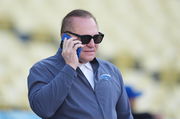
3 MLB Teams Get Sued: “Systematically Cheated Fans Out of Millions of Dollars”
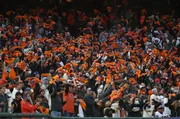
Yankees Veteran Leaves Brian Cashman Out to Dry With Mets Argument Amid ‘Running it Back’ Drama
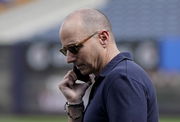
Framber Valdez Hit With Harsh Reality Check as Orioles, Blue Jays Lock Horns In Heated Battle
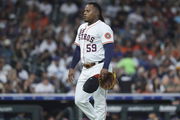
Spencer Jones’ Yankees Future Turns Murky After Aaron Boone Drops Cryptic Message, per Insider
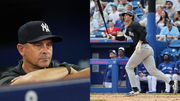
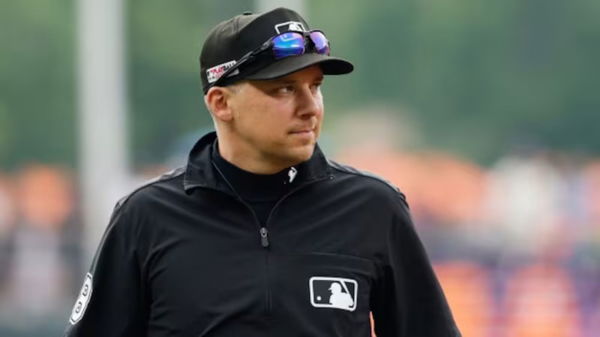
Imago
(AP Photo/Terrance Williams)
ADVERTISEMENT
What Is the Full Umpiring Crew Lineup for Game 6?
Game 6 of the 2025 World Series brings with it a new lineup of umpires as the Toronto Blue Jays and Los Angeles Dodgers face a defining night in Toronto. Adam Hamari will serve as the home plate umpire, his first behind-the-plate assignment in the Fall Classic. Known for a 94.77 percent accuracy on balls and strikes this season, Hamari has earned respect through a decade of steady growth. His calm demeanor and precision will be crucial in managing every call that could tilt a championship.
ADVERTISEMENT
Working first base will be Will Little, who joined the Major League staff in 2015 after debuting in 2013. With 11 years of major league experience and multiple postseason appearances, including five Division Series and a League Championship Series, he brings consistency to tight calls on the bag. His background as a collegiate baseball player at Milligan College adds a player’s instinct to his umpiring eye. In 2024, Little’s strike-zone consistency ranked among the top 10 percent of MLB umpires, reflecting sharp command under pressure.
Adrian Johnson, the second-base umpire and Game 6 crew chief, brings 17 years of experience and a calm authority to the diamond. He has worked across several postseason rounds since 2017, including the 2022 ALCS and 2024 NLDS. Johnson was also part of the historic 2024 Rickwood Field game featuring the first all-Black umpiring crew in major league history. His leadership and measured decision-making have become trademarks that lend credibility to this high-stakes assignment.
At third base, veteran Mark Wegner rounds out the infield coverage as one of MLB’s most seasoned officials with 26 years of service. A two-time World Series umpire before 2025, Wegner is working his third Fall Classic and first as the overall crew chief. His plate work in Game 7 of the 2017 World Series remains a highlight of his career. Joining them in the outfield are John Tumpane in left field and Alan Porter in right, both respected veterans with extensive postseason experience, ensuring that Game 6 will be officiated by one of MLB’s most qualified and battle-tested crews.
ADVERTISEMENT
How Does MLB Select and Rotate Umpires for the World Series?
Every fall, Major League Baseball handpicks its World Series umpiring crew from a pool of its highest-rated officials. Selection is based on a mix of experience, strike-zone accuracy, postseason performance, and professionalism throughout the regular season. Data from MLB’s Umpire Evaluation System and postseason assignments help determine which officials can handle the intensity of the sport’s biggest stage. Only those with a history of consistency and composure under pressure earn a World Series call-up, underscoring how rare the honor truly is.
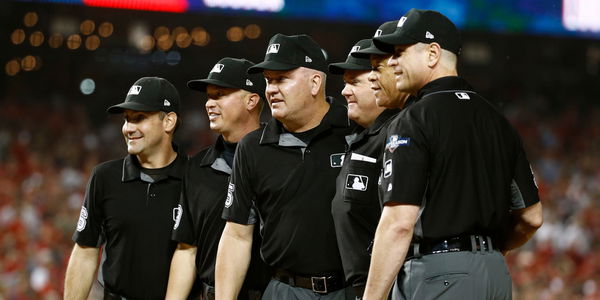
Imago
Credit: MLB.com
Once selected, the World Series crew follows a strict rotation policy that ensures balance and neutrality across the seven games. Each of the seven umpires works one game behind the plate while rotating through the bases and outfield positions. The setup keeps every official engaged while preventing fatigue from influencing critical calls late in the series. This system, refined over decades, helps maintain fairness and uniformity, ensuring that no single umpire’s presence overly shapes the championship outcome.
ADVERTISEMENT
What Role Do Umpires Play in High-Pressure Games Like Game 6?
Game 6 of the World Series magnifies every pitch, and with it, the responsibility of the umpires. Their strike zone can dictate the pace, rhythm, and even the strategy between the Los Angeles Dodgers and Toronto Blue Jays. A tight or wide zone changes how pitchers attack hitters and how hitters adjust their approach. Each call behind the plate becomes a small decision with massive weight, shaping innings that could decide a championship.
ADVERTISEMENT
Beyond the strike zone, umpires must make judgment calls on slides, tags, and check swings with split-second precision. In postseason baseball, every ruling draws scrutiny from players, managers, and millions of fans watching from home. According to MLB’s own accuracy tracking, top-tier umpires like Adam Hamari maintain strike-zone precision rates above 94 percent even under playoff intensity. That consistency, however, doesn’t dull the pressure, as one missed call can ignite controversy and echo through headlines overnight.
The psychological strain of these moments is as real for umpires as for the players themselves. Analysts analyze every decision across broadcast replays and social media feeds within seconds of being made. The challenge lies in maintaining composure, blocking out noise, and preserving fairness when emotions run high on both sides. In the end, their calm precision becomes part of the game’s drama, an invisible thread holding together baseball’s most chaotic and beautiful stage.
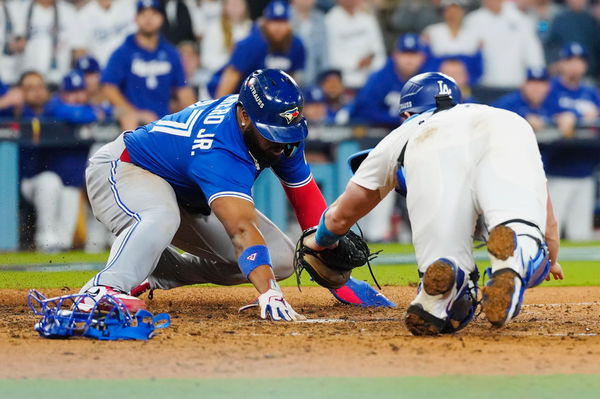
Imago
October 27, 2025, Los Angeles, California, USA: Toronto Blue Jays VLADIMIR GUERRERO Jr. (27) tags home plate to score ahead of the tag from Los Angeles Dodgers catcher Will Smith (16) during seventh inning Game 3 World Series playoff MLB, Baseball Herren, USA baseball action in Los Angeles on Monday. MLB 2025: World Series GM 1: Dodgers vs Blue Jays – ZUMAc35_ 20251027_zaf_c35_156 Copyright: xFrankxGunnx
ADVERTISEMENT
Are There Any Noteworthy Umpiring Moments In This World Series Leading Up to Game 6?
One of the most talked-about umpiring moments in this World Series came during Game 3 when Bo Bichette was picked off between first and second base after what appeared to be a walk. Home-plate umpire Mark Wegner called a late strike on a high fastball to Daulton Varsho, and the delayed signal allowed play to continue. Bichette, thinking he had ball four, wandered too far from the bag and was caught in a rundown. Blue Jays manager John Schneider calmly asked Wegner to be quicker and clearer with his calls.
The moment sparked strong reactions from fans, analysts, and players, showing how one call can swing momentum. Bichette’s instincts weren’t wrong; he simply acted faster than the mechanics of the umpire. Wegner later explained that his strike signal was consistent with how he’s called games for years. The bizarre sequence became a reminder that communication and timing matter just as much as accuracy in high-stakes games.
ADVERTISEMENT
As Game 6 approaches, that call lingers as a quiet test of consistency and composure for the entire crew. Scouts will watch every pitch closely, and executives will make decisions that echo across millions of screens. Umpires like Wegner now carry both experience and expectation into the night’s spotlight. In a series, this tense often places the space between right and wrong just one delayed call away.
As Game 6 looms, the strike zone belongs to Adam Hamari, but judgment belongs to everyone. Mark Wegner and his crew won’t just call the game; they’ll control its heartbeat tonight. In baseball’s grand theater, even the umpires expect perfection, but they never grant forgiveness.
ADVERTISEMENT
ADVERTISEMENT
ADVERTISEMENT